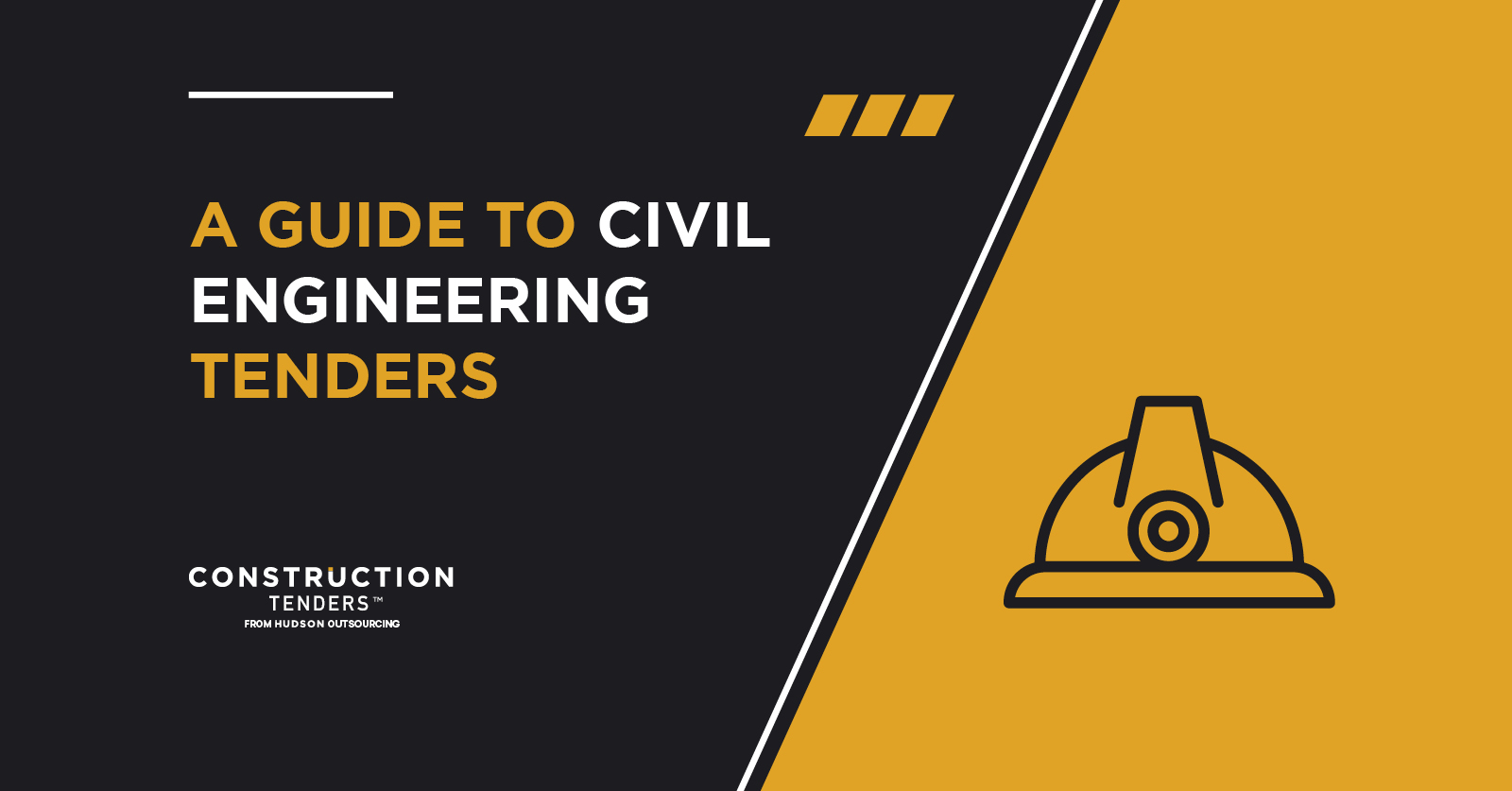Civil engineering tenders and where to find them
Civil engineering tenders are released by a broad range of organisations. Predominantly, they can be expected in the public sector and local councils are often procuring civil engineering works and services.
Civil engineering tenders can cover a broad scope of works and services. Often, they’re split into two broad categories:
-
Minor Civils and building works
These are typically used for minor works that are small and uncomplex construction projects. This could cover both new and repair and renovation works that are below £500,000 in value. These civil engineering tenders could cover activities and works such as:
- Footpath and cycleway improvements
- Flood alleviation and land drainage improvements
- Environmental improvements
- Highway improvements
- Hard landscaping
- Construction of above and below ground structures
- Drainage works.
-
Major and complex works
These typically involve large one-off projects with a value over £500,000. Such civil engineering tenders often cover works such as:
- Public buildings
- Bridges
- Coastal defences
- Infrastructures such as drainage and flood defences.
RIBA planning and outline
Civil engineering tenders may require you to provide a RIBA Plan of Work outline for a certain stage. For example, this may be required for civil engineering tenders for new housing. This could include but isn’t limited to:
- A detailed design of the work
- Technical approvals
- The main contract bid compliance checking
- Works compliance and design checking
- Design risk assessment
- Full technical design and specification
- Obtaining technical approval
- Provision Sums for meetings
- Project brief table
- Health and safety.
Framework agreements
Civil engineering tenders can often be found as part of a framework agreement. Framework agreements are multi-supplier agreements often used within the public sector. The length of each framework agreement can vary from a few months to multiple years. Some even offer the possibility of extension. Due to this, securing a place on a framework agreement can be a lucrative opportunity for your business.
Framework agreements are split into different lots. Each lot can either be a specific good, service, work or geographical location. They allow suppliers to apply to be part of a wider contract without needing to supply all areas. The number of suppliers for each lot varies and can be anything from four suppliers for one lot to ten. Suppliers need only apply for the specific lot[s] they specialise in.
Depending on the buyer, suppliers may be able to bid on any or all of the framework lots available. This will be stated within the tender documents and tender specification released by the buyer. If this is an option, a supplier must be able to demonstrate that they’re able to undertake all works. They must have the appropriate capacity and resources to undertake the works across all selected lots. Civil engineering tender lots are typically split into geographical location and project value.
Past experience
Civil engineering tenders will likely require you to provide previous contract examples of work you have completed. They should be similar in complexity and scope and style. You may be asked for up to three examples within the last five years. They are often referred to as case studies and can strengthen your bid. Make sure you keep them relevant and include any challenges you overcame.
The contract will be awarded to the MEAT
As civil engineering tenders are frequent within the public sector, you should aim to be the MEAT. The MEAT stands for the most economically advantageous tender. This means the buyer is looking for a tender that provides the most value for money. A buyer will look at a combination of factors both individually and combined. These can include, but aren’t limited to, the following:
- Innovation
- Accessibility
- Ability to deliver on time and within budget
- Technical ability
- Quality
- Environmental and sustainable factors.
Social value
Local authorities civil engineering tenders now have a mandatory minimum 10% weighting on social value. It’s an important aspect of any public sector contract. The promises you make in the section can be contractually binding, so it’s not something you should gloss over. Social value is the social, environmental and economic aspects you plan to address during the contract. This could include:
- COVID-19 recovery
- Reducing waste
- Creating new jobs and promoting skills
- Tackling climate change and reducing carbon emissions
- Paying employee National Living Wage to tackle economic inequality
- The equal opportunities policies you implement.
Company CVs
Construction contracts in the UK may require you to include detailed CVs of the team members proposed to work on the project. Contractors like to see that your employees are qualified, and you should demonstrate their suitability for the project at hand. Each CV should detail what the specific team member will be responsible for. You could include their:
- Job title
- Qualifications and accreditations
- Experience.
You could include a professional and friendly-looking photo of each team member. This will allow buyers to put a face to a name and is a nice touch. CVs should be focused, as relevant and concise as possible while still being thorough.
Need assistance writing your next civil engineering tenders?
You may not always have the time or resources to write winning civil engineering tenders. If that’s the case, outsourcing it to bid writing specialists can help you secure your next bid.
Our sister company Hudson Succeed, are bid writing experts. They have over 60 years of bid writing experience and an 87% success rate.
They offer four bid writing support services that can help you win your next civil engineering tenders. Whether you’re completely new to tendering or need your bid response proofread before you submit – they can help.
Tender Writing
Once you’ve found the perfect civil engineering tender for your business, why not send it over to us? Our Bid Writers can take care of it all for you. They’ll let you know what they need from you, providing you with a full Tender Writing breakdown. They’ll even submit it on your behalf.
Tender Ready
Our Tender Ready programme is perfect for those who have never tendered before. A Bid Writer will work with you to make sure you have everything you need in place to tender successfully. The 4-week programme offers your business:
- A 12-month subscription to Construction Tenders
- Access to Global Bid Directors and Senior Bidding professionals
- An organisation-wide Bid Library, including 3 case studies, 5 CV’s and 8 policies
- Additional flexible benefit options.
Tender Improvement
If you’ve been tendering but aren’t seeing the results you want, our Tender Improvement package can help. The Bid Team will assess your previous responses and tender documents, working with you to improve for future submissions. This package includes a 12-month subscription to Construction Tenders and additional tendering development services.
Tender Mentor
If you’ve written your own tender response and need someone to double-check it for errors, Tender Mentor can help. Our Bid Team will proofread your work for any inconsistencies, grammar or spelling mistakes. They’ll also ensure that it’s in line with the specification before you submit.
Where can I source civil engineering tender opportunities?
Sourcing the right civil engineering tenders for your business can take hours out of your day. There are various portals and websites that require different login details and passwords. Keeping track of them all can turn into a full-time job! We have a time-saving tool that can optimise your tendering efforts allowing you time to focus on your business.
Construction Tenders is a portal that hosts all the live construction leads and tendering opportunities within the construction industry. Gone are the days of relying on inaccurate CPV codes! Our Opportunity Trackers source and upload exclusive, public and private sector opportunities from across the UK. You’re able to filter and search the results by keyword, budget, location and more.
Below are previous civil engineering tenders sourced on our portal:
Civil Engineering Enabling Works at Holborn, South Shields – to Include Extensive Maritime and Geotechnical Elements
South Tyneside Council- North East- Budget: Undisclosed
Civil Engineering Works Associated with Water Supply to Group Water Schemes Including Minor Environmental Works in County Donegal
Donegal County Council- Republic of Ireland- Budget: Undisclosed
HCD0118 SC Engineering Services – HCD 0118 Provision of Structural & Civil Engineering Services
Donegal County Council- International- Budget: Undisclosed
Highways & Civil Engineering Materials
Newcastle City Council- North East- budget: Undisclosed
Minor Civil Engineering work for Warwick District
Coventry Council- Solihull – Warwickshire- West Midlands- Budget: £4,000,000
A subscription to Construction Tenders offers your business:
- Access to all unique, private and public sector opportunities across the Construction industry.
- An on-hand Account Manager to answer any questions you may have about civil engineering tenders.
- A daily email bulletin sent straight to your inbox when new construction tenders are uploaded that day.
- Discounted support from Hudson Succeed, our bid writing division.
The best way to venture into the tendering world is through booking a live demo of Construction Tenders.
We also source opportunities for services including;
- Civil Engineering Tenders
- Health & Safety Tenders
- Cable Laying Tenders
- Structural Engineering Tenders
- Electrical Tenders
- Building Works
- Joinery Tenders
- Architectural Tenders
- Refurbishment Tenders
- Brickwork Tenders
- Small Construction Tenders
- Surveying Tenders
- Demolition Tenders
- Flooring Tenders
- Glass Tenders
- M&E
- Cost Consultancy
- Painting Contracts
- Decorating Tenders
- Masonry and many more.
Get in touch to find out how we can help your business grow.
Upgrade to Discover Elite
Upgrading to Discover Elite can save you even more time, helping you identify tendering opportunities even when you’re busy. Our two time-saving tools can improve your competitor awareness and bidding success rate. Each package can help save you even more time when searching for civil engineering tenders.
The Ultimate Time Saver package includes:
- An annual subscription to a maximum of two Hudson Discover sector-specific portals. This option best suits a business that overlaps two industries such as Construction and Logistics for example.
- A maximum of five tender breakdowns per month.
- Pre-market and award engagement notices monitored on your behalf.
- Buyer portal management including registration, password management, downloading documents and assessing viability based on your bid or no-bid.
- Weekly phone calls with your on-hand Account Manager to discuss viable civil engineering tendering opportunities.
The Become a Pre-Bid Master package includes:
- All of the above.
- Up to seven tender breakdowns per month.
- A Bid Strategy delivered by a Senior Bid Manager with a minimum of 5 years of experience. It will also be managed by our Global Bid Director.
Contact us to find out how we can help your business.



